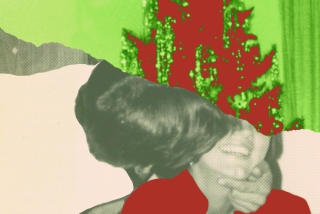The Things We Leave Behind
The epic dimensions of Tuesday’s tragedy have summoned a language of superlatives. The worst terrorist attack in U.S. history. New York’s tallest buildings, laid flat. The biggest blow to America’s sense of security since Pearl Harbor.
Historians eventually will try to make sense of the tides sweeping through America. For the moment, however, the random mementos that the victims left behind give an eloquent voice to some of the nation’s private yearnings. An unmade bed, a prized set of golf clubs or a small glass souvenir from a long-ago family outing.
Every one of the some 5,300 missing or dead in the attacks left traces of a life, each as carefully unique as a snowflake. Collectively, these simple things form a mosaic of human experience, a national scrapbook dedicated to a great national theme: the singularity of every individual.
While investigators in New York continue foraging for forensic evidence, it will be left to the families of the missing people to begin sifting through their loved ones’ personal artifacts. Inevitably, in the weeks and months ahead, there will be questions about what to keep and what to let go.
Last week, Americans joined in an elegiac national symphony of somber pride and grief. The stories below are of a different scale, evidence of the loss and longing, and in a few cases--against all odds--of hope.
Reed Johnson
*
The green camouflage fatigues--his last name stitched over one pocket and the word “Army” over the other--hangs in Roshan Singh’s closet along with his casual clothes.
It is the same uniform he wears in the photograph his family has given out by the hundreds--oversize color copies of the 21-year-old man wearing a serious expression, cap pulled low on his eyebrows, a U.S. flag as the backdrop.
And it closely resembles the uniform worn by an aunt assigned to greet family and friends who have come to sit vigil in Queens.
Earlier this summer, Roshan graduated from Army Reserve training, a commitment he made to serve his country and to honor that uncle, a 20-year military veteran still on active duty. His mother, Toolisdai Awan, and sister, Khamla Singh, attended the graduation ceremony. It was another step toward Roshan’s longtime goal: a college education and career as an engineer.
Roshan and Khamla had both secured jobs at the Windows on the World restaurant in the north tower of the World Trade Center: He as an audiovisual technician; she as a banquet manager. Both still are reported missing.
The night of the disaster was supposed to include a simple visit with relatives--the family planned to drink coffee and eat cake. Instead, family members are handing out copies of photographs of Khamla and Roshan.
More to Read
Sign up for Essential California
The most important California stories and recommendations in your inbox every morning.
You may occasionally receive promotional content from the Los Angeles Times.











